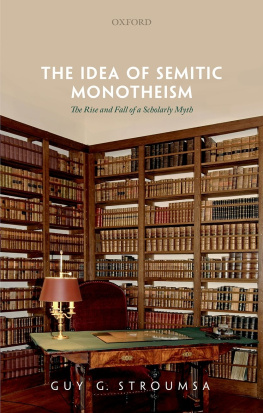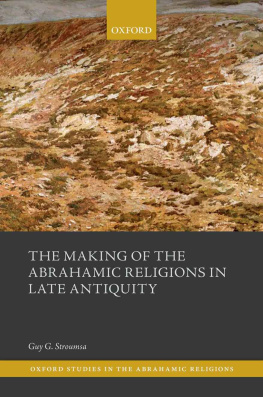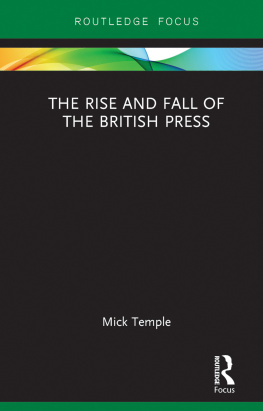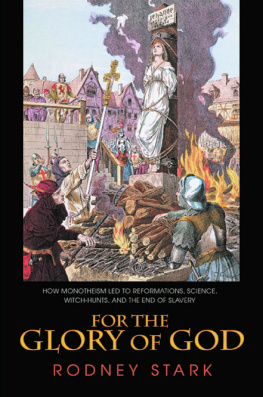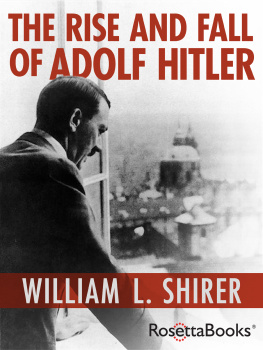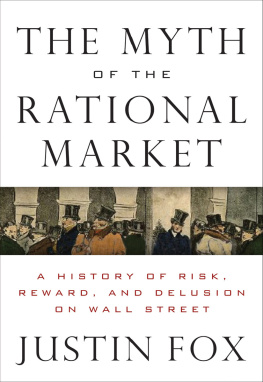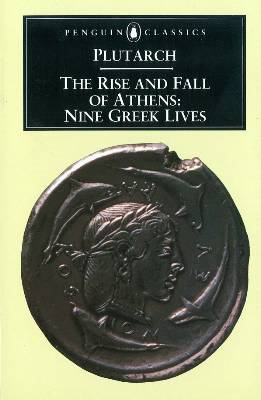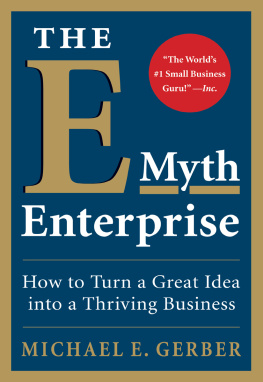Guy G. Stroumsa - The Idea of Semitic Monotheism: The Rise and Fall of a Scholarly Myth
Here you can read online Guy G. Stroumsa - The Idea of Semitic Monotheism: The Rise and Fall of a Scholarly Myth full text of the book (entire story) in english for free. Download pdf and epub, get meaning, cover and reviews about this ebook. year: 2021, publisher: OxfordUP, genre: Religion. Description of the work, (preface) as well as reviews are available. Best literature library LitArk.com created for fans of good reading and offers a wide selection of genres:
Romance novel
Science fiction
Adventure
Detective
Science
History
Home and family
Prose
Art
Politics
Computer
Non-fiction
Religion
Business
Children
Humor
Choose a favorite category and find really read worthwhile books. Enjoy immersion in the world of imagination, feel the emotions of the characters or learn something new for yourself, make an fascinating discovery.
- Book:The Idea of Semitic Monotheism: The Rise and Fall of a Scholarly Myth
- Author:
- Publisher:OxfordUP
- Genre:
- Year:2021
- Rating:5 / 5
- Favourites:Add to favourites
- Your mark:
- 100
- 1
- 2
- 3
- 4
- 5
The Idea of Semitic Monotheism: The Rise and Fall of a Scholarly Myth: summary, description and annotation
We offer to read an annotation, description, summary or preface (depends on what the author of the book "The Idea of Semitic Monotheism: The Rise and Fall of a Scholarly Myth" wrote himself). If you haven't found the necessary information about the book — write in the comments, we will try to find it.
The Idea of Semitic Monotheism: The Rise and Fall of a Scholarly Myth — read online for free the complete book (whole text) full work
Below is the text of the book, divided by pages. System saving the place of the last page read, allows you to conveniently read the book "The Idea of Semitic Monotheism: The Rise and Fall of a Scholarly Myth" online for free, without having to search again every time where you left off. Put a bookmark, and you can go to the page where you finished reading at any time.
Font size:
Interval:
Bookmark:


Great Clarendon Street, Oxford, OX2 6DP, United Kingdom
Oxford University Press is a department of the University of Oxford. It furthers the Universitys objective of excellence in research, scholarship, and education by publishing worldwide. Oxford is a registered trade mark of Oxford University Press in the UK and in certain other countries
Guy G. Stroumsa 2021
The moral rights of the author have been asserted
First Edition published in 2021
Impression: 1
All rights reserved. No part of this publication may be reproduced, stored in a retrieval system, or transmitted, in any form or by any means, without the prior permission in writing of Oxford University Press, or as expressly permitted by law, by licence or under terms agreed with the appropriate reprographics rights organization. Enquiries concerning reproduction outside the scope of the above should be sent to the Rights Department, Oxford University Press, at the address above
You must not circulate this work in any other form and you must impose this same condition on any acquirer
Published in the United States of America by Oxford University Press
198 Madison Avenue, New York, NY 10016, United States of America
British Library Cataloguing in Publication Data
Data available
Library of Congress Control Number: 2021932091
ISBN 9780192898685
ebook ISBN 9780192653864
DOI: 10.1093/oso/9780192898685.001.0001
Printed and bound by
CPI Group (UK) Ltd, Croydon, CR0 4YY
Links to third party websites are provided by Oxford in good faith and for information only. Oxford disclaims any responsibility for the materials contained in any third party website referenced in this work.
For Tema and Mark Silk
Although most chapters of this book were written in Jerusalem, I have used library facilities also in Oxford, Ann Arbor, Chicago, Berlin, and Paris. I started working on it during my Oxford stint, as the first Professor of the Study of the Abrahamic Religions. My College, Lady Margaret Hall, is located at the end of Norham Gardens, where Max Mller once lived. My original puzzlement at the fact that the Chair had only been established in 2009, rather than in his days, a century-and-a-half earlier, lies at the root of this book.
A generous Research Award from the Alexander-von-Humboldt-Stiftung, in 2008, permitted the initial research on this project. My intensive involvement with its topic started as I worked on the Jordan Lectures in Comparative Religion, which I delivered in the spring of 2013 at the School of Oriental and African Studies in London. I wish to thank Catherine Hezser for her kind invitation. I did not guess at the time that it would take me so long to transform these lectures into a book. My gratitude also goes to Peter Mack for the Workshop on Judaism and Islam in the Mind of Europe that he asked me to organize at the Warburg Institute, of which he was then Director, on June 6, 2013. I am grateful to the Frankel Center for Judaic Studies at the University of Michigan in Ann Arbor for a Fellowship in 2015, and to the John U. Nef Committee on Social Thought at the University of Chicago for a Kohut Visiting Professorship in 2016. I was able to pursue research on this book with the help of remarkable libraries in Ann Arbor and Chicago. I wish to thank Luca Guliani, former Rector of the Wissenschaftskolleg zu Berlin, for having extended to me a Fellowship at this remarkable institution in 2017. The excellent conditions at the WiKo did much to facilitate my research. The lecture I gave at the reception (jointly with Sarah Stroumsa) of the Leopold-Lucas Prize in Tbingen on May 8, 2018 provided further incentive to publish my views on the topic (Guy G. Stroumsa and Sarah Stroumsa, Eine dreifltige Schnur: ber Judentum, Christentum und Islam in Geschichte und Wissenschaft [Tbingen: Mohr Siebeck, 2020]). I wish to express my gratitude to the Evangelical Theological Faculty at the University of Tbingen for this award.
I am beholden to Rajeev Bhargava (CSDS, Delhi), Corrine Bonnet (Toulouse), Arthur Bradley (Lancaster), Renaud Gagn, Simon Goldhill and Geoffrey Lloyd (Cambridge), Charles Stang (CSWR, Harvard), and Carsten Wilke (Central European University, then Budapest) for having invited me to present parts of this work at a number of workshops and conferences. Over the years, Dominique Bourel (CNRS, Jerusalem) read a number of the chapters in their draft form and discussed their content with me. In acts of true friendship, both Philippe Borgeaud (Geneva) and Maurice Kriegel (EHESS, Paris) read the whole typescript; I am much indebted to them for their important comments. Naphtali Meshel (Jerusalem) and Perrine Simon-Nahum (CNRS, Paris) kindly agreed to read various chapters. Theodor Dunkelgrn (Cambridge) and Robert Priest (Royal Holloway, London) commented on Chapter six. My own reflection on Renan has benefited from almost daily conversations with Franois Hartog (EHESS, Paris) in Chicago during the fall of 2016, when we were both teaching in the John U. Nef Committee on Social Thought at the University of Chicago. A French version of the first half of Chapter four, published in Asdiwal in 2018, was dedicated to the distinguished Parisian Sanskritist Charles Malamoud, in recognition of his friendship and generosity over the past five decades. Jacques Le Brun, with whom I discussed various aspects of this book, will not be able to read it: he became a victim of Covid-19 in early spring 2020.
At Oxford University Press, I was lucky to have Tom Perridge as a thoughtful and gracious editor. I am most grateful to the anonymous readers, who called my attention to a number of serious problems in the original typescript. The reports they produced helped me to clarify and sharpen my thought and to prune my text of many errors and typos. Once more, Sara Troppers excellent editing saved me from many oddities and infelicities. I am beholden to Marc Sherman, who compiled the indices with great care. I wish to thank the Centre des monuments nationaux in Paris for allowing me to use their photo of Renans study at the Collge de France, as reconstituted in Renans native home in Trguier, for the dust jacket. My gratitude goes to Margo Stroumsa-Uzan for suggesting this photo.
Throughout the years, Sarah Stroumsa has been my first, last, and toughest reader. My debt to her is infinite.
I dedicate this book to Tema and Mark Silk, in gratitude for half a century of constant friendship and intellectual exchange.
Jerusalem,
January 2021
Les fleurs de lhistoire religieuse sont des fleurs tranges.
[The flowers of religious history are strange flowers]
Ernest Renan, Nouvelles tudes dhistoire religieuse, Preface
Es gelingt dem Gelehrten erst mit Hlfe der Geschichte (aber nicht von seiner persnlichen Erfahrung aus), es gegenber den Religionen zu einem ehrfurchtsvollen Ernste und zu einer gewissen scheuen Rcksicht zu bringen
[It is only with the help of the study of history (but not from personal experience) that a scholar becomes able to treat religions with a reverent seriousness and a certain shy regard]
Friedrich Nietzsche, Jenseits von Gut und Bse, 58
Car cest inou, la rage des gens dune religion tudier celle des autres.
[Its unbelievable, the craze that people of one religion bring to study the religion of others.]
Font size:
Interval:
Bookmark:
Similar books «The Idea of Semitic Monotheism: The Rise and Fall of a Scholarly Myth»
Look at similar books to The Idea of Semitic Monotheism: The Rise and Fall of a Scholarly Myth. We have selected literature similar in name and meaning in the hope of providing readers with more options to find new, interesting, not yet read works.
Discussion, reviews of the book The Idea of Semitic Monotheism: The Rise and Fall of a Scholarly Myth and just readers' own opinions. Leave your comments, write what you think about the work, its meaning or the main characters. Specify what exactly you liked and what you didn't like, and why you think so.

